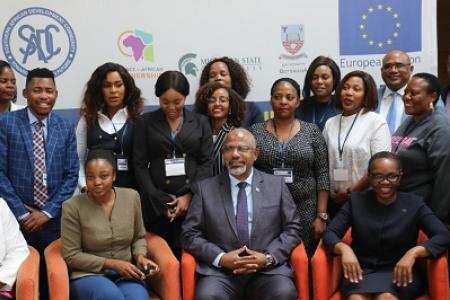What is the SADC Dialogue Facility (SDF)
The Southern African Development Community (SADC) Dialogue Facility (SDF) is a programme that seeks to enhance co-operation and dialogue for Southern African regional integration, by focussing on the quality and institutionalisation of policy dialogue between SADC and its main stakeholders, namely International Cooperation Partners (ICPs), Non-State Actors (NSA) and other peer organisations both on the continent (e.g. other regional economic communities (RECs) and in Europe.
The objective of the programme is to contribute to the implementation of the SADC regional integration agenda.
This is to be achieved through the improvement of quality regional policy development and implementation of key SADC priorities, SDF strengthened stakeholder engagement and participation in the SADC regional integration process; and better leverage and promotion of partnerships outside SADC in terms of knowledge management, experience sharing, resource mobilisation and skills enhancement.
Building on the conclusions of the March 2017 SADC Ministerial Retreat 'The SADC We Want', SDF facilitates multi-stakeholder policy dialogues to fast-track implementation of the SADC regional integration agenda.
How is the SDF financed?
SDF is financed under a €3m EU fgrant.
What actions will be supported under the SDF?
The SDF facilitates peer-to-peer exchanges and inter- and intra-regional and cross-sector dialogues for the SADC Secretariat and SADC institutions as well as institutions from the EU and other regions.
The Facility leverages partnerships for technical peer exchanges and learning for policy development and implementation of key SADC priorities. The Programme allows for multi-stakeholder policy dialogues, technical peer learning, expertise exchange and studies/research to inform evidence-based policy dialogue in areas of mutual concern. The SDF also allows also for benchmarking against other integration processes with regard to monitoring and enforcing compliance with regional integration commitments.
The Programme seeks to contribute to the implementation of the SADC regional integration agenda through increased collective leveraging of global platforms to reinforce the relationship among stakeholders in themes of common interest and will allow the creation of an open space for alignment around issues of regional, continental and global importance.
The Programme addresses some of the constraints and challenges identified by the SADC Council of Ministers, including the limited involvement of different stakeholders in the regional integration process and a rather isolated approach by SADC in pursuing its integration objectives without consideration of lessons learned and experiences of other regional integration processes.
The SDF supports the SADC Region to strengthen compliance and implementation of existing strategies and policy frameworks through enhanced multi-stakeholder dialogue and to benefit from peer exchanges and hands-on technical expertise. It also builds on already existing good practices such as technical networks and dialogues already initiated through various platforms.
When will SDF be operational?
The SADC Dialogue Facility Contribution Agreement became operational in July 2019.
What are the Key Result Areas for SDF?
SDF is expected to result in the improvement in the quality of regional policies and the implementation of key SADC priorities. The Programme is also expected to achieve integration goals so that the citizens of the SADC Region will benefit from stronger, equitable and sustainable economic growth, increased collective leverage in global platforms and enhanced social opportunities.
It is estimated that dialogues developed under SDF can eventually lead to tangible actions to strengthen capacities for implementation, further policy development and enhanced coordination with different stakeholders in the key areas of regional integration as identified by the SADC strategic frameworks and the Regional Indicative Strategic Development Plan (RISDP).
This will further lead to broader areas of common interest, such as the effects of climate change, resilience, gender equality and youth empowerment; as well as increase capacities for research and innovation, economic diversification, job and wealth creation, institutional reforms and alignment of strategic priorities.
- Informed focal areas for dialogue, the facility began its work by carrying out wide consultations with SADC, ICPs and non-state actors (NSAs). The main themes which emerged include: Establishment and Operationalisation of Agriculture Development Fund; Promotion of Tourism in the post-pandemic and post-RETOSA (Regional Tourism Organization for Southern Africa) context in the region; Circular and Blue Economy processes; Digital transformation in support of industrialisation; Value Chains in priority sectors of Mining, Pharmaceuticals, Agro-processing, and Textile Leather; SMEs Access to Finance in Support of Industrialisation.
- Developed structured Public-Private Dialogue Mechanisms for Improving Investment and Business Environment; Mainstreaming Coordinated Border Management Policy for Enhancement of Trade Facilitation; and Economic Growth and Employment creation in the SADC Region.
- Produced a brief on the topic of Conflicts, Climate Change and Development.
- Provided support and recommendations for improvement through an Assessment of Operations of Thematic Groups (TGs) under the SADC-ICP Dialogue Platform. The assessment focussed on standardising TGs’ operations, including Multi-Year Action Plans to ensure that their work is aligned to the RISDP 2020-2030. The assessment included an evaluation of the impact of COVID-19 on the work of the Thematic Groups. The assessment’s recommendations are now being implemented with the support of the Facility.
- On 20th May 2021, based on the priority themes identified, a stakeholder dialogue was held under the theme “Coordinated Border Management (CBM) for enhanced Trade Facilitation”. The dialogue was attended by 125 representatives from both the public and private sectors as well as SADC’s International Cooperating Partners, and aimed to raise awareness among stakeholders on the importance of coordinated cross-border management and its impact on competitiveness of SADC products for increasing intra-regional trade. To support the institutionalisation of the recommendations identified in dialogue with these representatives, the Facility’s expert in coordinated border management worked with the SADC Secretariat to produce an Action Plan for follow-up, now under implementation.
- Produced produced an analytical paper to inform the SADC Joint Sector Meeting of Ministers of Labour, Finance, Trade and Industry, including social partners. The author will be presenting this paper at the SDF-facilitated “Dialogue on Pro-Employment Policies & Strategies in SADC” that was held in Lilongwe, Malawi on 6-7 December 2021.

